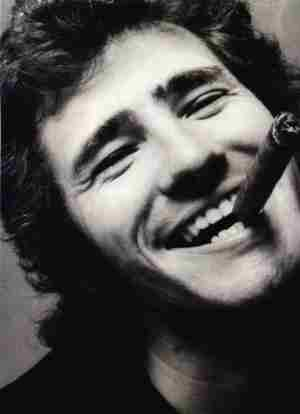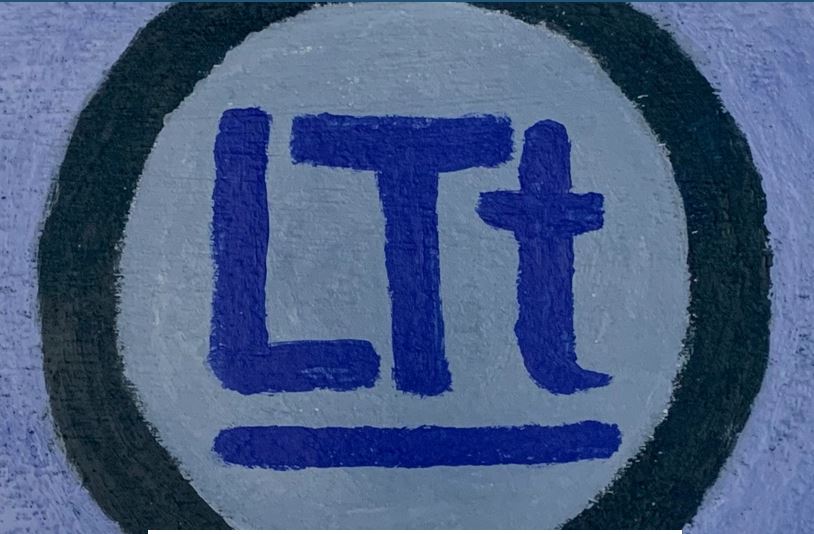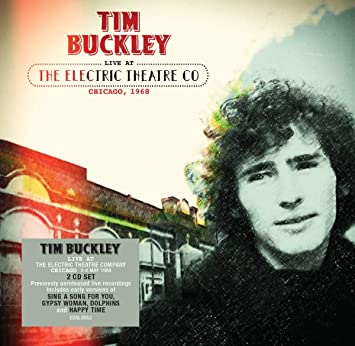|
by
Mark Deming
In
the age of the smartphone, if a musician was to test out new
songs and ideas in front of a live audience, then, like clockwork,
videos would be posted online for everyone to see and post
comments.
And
even if the songs weren’t played live, there’s always
the possibility of demos being leaked and downloaded, which
has happened to dozens of musicians this century. But, back
in 1968, the pre-internet world allowed for artists to take
bigger risks in performances without fear of backlash from
music bloggers.
That
year, legendary folk singer-songwriter Tim Buckley travelled
to Chicago with a new batch of musical ideas to work out.
Over two nights, he gave two performances at the Electric
Theatre Co., accompanied by an unknown bass player and frequent
collaborator Carter “C.C.” Collins on congas and
tambourine. And rather than promote his recent sophomore album,
Goodbye and Hello, Buckley workshopped new original songs
that would appear on his next folk release Happy Sad along
with a few covers that would later be re-recorded for his
eighth and more funk-based album Sefronia.
In
addition to songs that would find a place on studio albums,
he also treated his Chicago audiences to improvised jams of
traditional folk songs, popular songs and, most notably, an
interpretation of a Johnny Cash classic with Buckley’s
signature flair.
For
more than 50 years, the skilled guitar playing and shamanic
vocal improvisations of Buckley’s Chicago performances
remained unreleased — that is, until now. On Friday,
L.A.-based record label Manifesto Records, which is headed
by the nephew of Buckley’s late manager, unearthed the
concert recordings and offered his following the chance to
assess a new period in the singer’s stylistic progression
with the 14-song double LP 'Tim Buckley: Live at the Chicago
Theatre Co. 1968'.
And despite many songs on it having already appeared on studio
albums, this new release does tout a few exclusive tracks,
which are also among the album’s most enthralling moments.
The
first of the two standout exclusive recordings is a reworking
of Fred Neil’s song “Roll On Rosie,” where
Buckley flexes his poetic lyricism over upbeat congas, bass
and guitar. Among the most striking declarations from Buckley’s
smooth but gnarled voice is the line “Some men read their
religion out of books/But all I gotta do is stare in your
eyes.”
|
'Live
at the Electric Theatre Co. 1968 ultimately pays off
with an epic 16-minute version of the folk standard
“Wayfaring Stranger.”
Trust me when I say it’s not your grandfather’s
Burl Ives vinyl'
|
All
over this album, Buckley plays the bluesman, often singing
about his woman and her love. This song is no different and,
after the sparser, more developed opening tracks, his band
lets loose and turns up the intensity to make the nine-minute
“Improvisation on Roll On Rosie” a memorable addition
to his canon. This is not to say that the first two songs
are throwaways, though. The opening ballad “Sing A Song
For You,” already in its final studio form save some
switched syntax, perfectly sets the tone for songs to follow
with inviting lyrics such as, “So please let me sing
a song for you /One I’ve known so very long/Oh please
can you find the time?” If it’s a song as good as
“Roll On Rosie,” that won’t be a problem.
The
other unique highlight from this live album is Buckley’s
unexpected cover of Johnny Cash’s “Big River.”
Whereas Cash’s original was taut and controlled, Buckley
and his band’s cover is much looser and more than three
times as long, sounding more like it comes from the English
songbook than the American one. Despite having been written
as country music, the song’s natural imagery is easily
adaptable into Buckley’s wheelhouse.
It’s
interesting to note that, like his son Jeff would go on to
do in the 1990s, Buckley covered songs outside of his own
genre and interpreted them into his style, including other
songs on this release such as The Jaynett’s “Sally
Go ’Round the Roses” and a tune from the 1953 musical
Lily, “Hi-Lili, Hi-Lo.” “Sally Go ’Round
the Roses” would later appear on Buckley’s Sefronia,
but played in a funkier, less serious manner than the improvisation
found here, which sounds as if it’s in the early stages
of development.
Although
Buckley’s Chicago performances are more than a half century
old, the sound quality of these recordings is, for the most
part, well done by Manifesto. As far as the live aspect of
the album goes, the crowd behaves reverential and applauds
after song medleys end. Buckley only once addresses the crowd
following the blues song “Looks Like Rain” to say,
“Short announcement…that was a Beethoven fanfare,”
whether that’s actually true or he’s joking around.
For the most part, Buckley’s singing and warm guitar
playing dominate the mix — as they should — while
the congas and bass briefly come into focus and return to
their supporting roles. The only time the rhythm section takes
center stage is during the outro to “Look Out Blues”
into the beginning of the shell of a song that would later
become the 12-minute conga odyssey, “Gypsy Woman,”
on Happy Sad.
Throughout
the album’s hour and a half runtime, the spotlight for
the rhythm section is short, but showcases the strength of
its playing while accompanying Buckley. But on several unaccompanied
parts of this double LP, there’s noticeable static, despite
Manifesto’s attempts to mitigate it. Staticky recordings
detract from the pretty folksy guitar of “Hi-Lili, Hi-Lo”
and the brooding atmosphere of “The Father Song.”
In addition to static, several tracks such as “Dolphins”
and “Happy Time” are sloppily structured —
even by the standards of live workshopping — and the
album would have benefitted in quality and length from their
omission.
But,
in remedy to all the technical faults and slapdash works-in-progress,
Live at the Electric Theatre Co. 1968 ultimately pays off
with an epic 16-minute version of the folk standard “Wayfaring
Stranger.” Trust me when I say it’s not your grandfather’s
Burl Ives vinyl. Buckley embodies the titular vagabond riding
atop an endless road of raucous folk jazz, utilizing his voice-as-instrument
singing that would come to fruition two years later on Starsailor.
His intense voice bursts out its choruses, singing “I’m
going there to see my brother/I’m going there no more
to roam/I’m going there it’s just over Jordan/I’m
going there to make my home.”
After
a short jam, the band goes into a conga and spoken word interlude
where Buckley critiques the music industry, “It all started
out with a beat, Lord/A very long time ago/And they told me
at the front make it pretty/Cause that’s the way it’s
gonna go,” and delivers other more abstract improvisations
about the sun, moon, foxes, rabbits and “the beat.”
The trio ultimately returns to the folk jazz frenzy in which
they started and close the performance to energetic applause.
Several of Buckley’s live albums include “Wayfaring
Stranger,” but this performance might be the one with
the most powerful playing and impassioned delivery. It ends
the album on a strong note.
Live
at the Electric Theatre Co. 1968 is a fascinating artifact
that captures songs that would reappear throughout Buckley’s
career. For close listeners, it’s fun to pick out which
songs are fully realized and which ones are still being figured
out. Never before heard covers such as “Improvisation
on Roll On Rosie” and “Big River” make this
release a must-listen for any diehard Buckley fan. And although
it’s not as transcendent as the previous live album Dream
Letter, Live at the Electric Theatre Co. 1968 adds another
touchstone in Buckley’s creative output and allows us
to experience how his earlier folk sound was morphing into
what would be found on definitive albums such as Happy Sad,
Starsailor and Sefronia. We’re just lucky someone had
the foresight to record it for posterity.
Rating:
4/5
©
2019 Luke Furman /Lukes
Turntable
|


